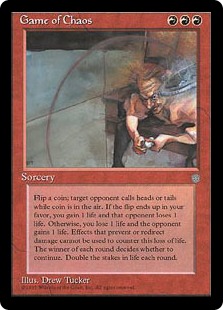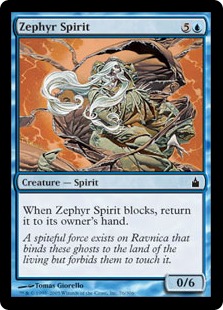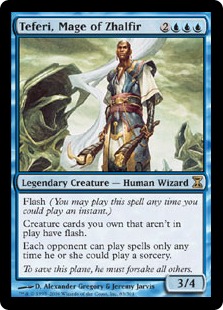
It is only a game, people.
(Note: Parts of this post may not be relevant due to the nature of D&D, or replies to previous posts in the discussion. However, I have decided to show the entirety of the post for clarity purposes.)
Quote fromTempest Stormwind
05-15-06, 03:58 PM
I still stand by the argument that this is a fundamental difference between old school (basic D&D: 1 race/class, AD&D: very limted multi-classing) vrs new school (I buy a book and there is a class in their and I want it gimmie gimmie). The trend I see is old school = roleplayers, new school = optomizers.
Note to New school people: Don't listen to what you hear, you aren't a dork if you roleplay. It is ok to indulge in what D&D is all about, roleplay. If you try it and have a good DM, I guarantee you'll have a blast and won't care so much about optomizing.
Okay, that's it.
I'm hereby proposing a new logical fallacy. It's not a new idea, but maybe with a catchy name (like the Oberoni Fallacy) it will catch on.
The Stormwind Fallacy, aka the Roleplayer vs Rollplayer Fallacy
Just because one optimizes his characters mechanically does not mean that they cannot also roleplay, and vice versa.
Corollary: Doing one in a game does not preclude, nor infringe upon, the ability to do the other in the same game.
Generalization 1: One is not automatically a worse roleplayer if he optimizes, and vice versa.
Generalization 2: A non-optimized character is not automatically roleplayed better than an optimized one, and vice versa.
(I admit that there are some diehards on both sides -- the RP fanatics who refuse to optimize as if strong characters were the mark of the Devil and the min/max munchkins who couldn't RP their way out of a paper bag without setting it on fire -- though I see these as extreme examples. The vast majority of people are in between, and thus the generalizations hold. The key word is 'automatically')
Proof: These two elements rely on different aspects of a player's gameplay. Optimization factors in to how well one understands the rules and handles synergies to produce a very effective end result. Roleplaying deals with how well a player can act in character and behave as if he was someone else.
A person can act while understanding the rules, and can build something powerful while still handling an effective character. There is nothing in the game -- mechanical or otherwise -- restricting one if you participate in the other.
Claiming that an optimizer cannot roleplay (or is participating in a playstyle that isn't supportive of roleplaying) because he is an optimizer, or vice versa, is committing the Stormwind Fallacy.
How does this impact "builds"? Simple.
In one extreme (say, Pun-Pun), they are thought experiments. Optimization tests that are not intended to see actual gameplay. Because they do not see gameplay, they do not commit the fallacy.
In the other extreme, you get the drama queens. They could care less about the rules, and are, essentially, playing free-form RP. Because the game is not necessary to this particular character, it doesn't fall into the fallacy.
By playing D&D, you opt in to an agreement of sorts -- the rules describe the world you live in, including yourself. To get the most out of those rules, in the same way you would get the most out of yourself, you must optimize in some respect (and don't look at me funny; you do it already, you just don't like to admit it. You don't need multiclassing or splatbooks to optimize). However, because it is a role-playing game, you also agree to play a role. This is dependent completely on you, and is independent of the rules.
And no, this isn't dependent on edition, or even what roleplaying game you're doing. If you are playing a roleplaying game with any form of rules or regulation, this fallacy can apply. The only difference is the nature of the optimization (based on the rules of that game; Tri-Stat optimizes differently than d20) or the flavor of the roleplay (based on the setting; Exalted feels different from Cthulu).
Conclusion: D&D, like it or not, has elements of both optimization AND roleplay in it. Any game that involves rules has optimization, and any role-playing game has roleplay. These are inherent to the game.
They go hand-in-hand in this sort of game. Deal with it. And in the name of all that is good and holy, stop committing the Stormwind Fallacy in the meantime.
Say What?

Unfortunately, nothing can make
Zephyr Spirit worth playing.
That's all well and good for the D&D players, or role-players in general, but how does it help us collectible card gamers? Well, I hope to show that the Stormwind Fallacy can be applied to card games as well. I believe for us, though, it applies to slightly different, yet still shockingly similar, ideas about gaming. Without further ado, I present the following:
The Stormwind Fallacy, Teflon Redux (a.k.a. The Enjoy vs. Destroy Fallacy)
Just because one is playing a powerful deck does not mean that one is not also having fun. Alternately, just because one is playing a suboptimal deck does not guarantee one is having fun.
Corollary: The amount of fun derived from the game you are playing is not predicated upon the deck you are playing.
Generalizations:
G1: A person does not automatically have fun playing a non-optimal deck, and vice versa
G2: A person is not automatically displeased by playing an optimized deck, and vice versa.
Basic Statements of Logic:
1: Something that is automatic always happens.
2: Something that is not automatic doesn't always happen, but rather may or may not happen. Specifically, the absence of an absolute positive is not necessarily a negative. It is indeterminate.
Proof: These two portions of the game rely on unrelated choices to the game. The deck you choose to play may enhance your enjoyment, but it is not dependent. Many players enjoy the game regardless of the deck they play. As a corollary, playing a deck known to win may increase or decrease your enjoyment, but this is based solely on your personality quirks, and not on the deck itself. The deck itself is unable to single-handedly control your enjoyment.
Addendum: A deck may be able to increase or decrease enjoyment based on the individual. However, it is only one factor.
The Fallacy in Effect
So, what does that give us? Well, let's throw some extremes out there since we are basing this on generalizations. There are going to be outliers, of course. Imagine Vintage with no restricted or banned list. A majority of games could easily be decided before the loser of the die roll even plays a land. You'd have to mulligan into some sort of 0-cost counter. And yet, even in this extreme environment, there would be players who are having fun. This may not be fun to me, but it is enjoyable to some amount of players. The other extreme are players acting out a story with the cards. They, much like the "Drama Queens" listed above, aren't actually playing Magic. They do not need the rules structure of Magic to accomplish their goal. Note that this is different than playing thematic elements. The focus of the "Drama Queen" is not on playing the game. Their focus is the story they wish to tell. Having a favorite tribe is not being a "Drama Queen", it is being a "Human Being." Trying to add a deck to a story is not. They are telling a story with cards, and I have known plenty that just use the flavor text to tell stories. And yet, even without needing the rules of the game, merely using your opponent as a player in your story, these players are having fun. Even at the extremes of our probabilities, our proof holds true.

Aren't court magicians supposed
to be funny, not frustrating?
In conclusion, we find that the enjoyment you have of a game is in the hands of you and you alone. You may choose to play a stronger or weaker deck, and that is solely your decision. But please allow me to leave you with this advice: If you are playing the powerful deck to have fun, don't deride the players who choose not to because they want to have fun. They, like you, have made the decision that they believe will lead them to the most enjoyment. Conversely, if you have chosen a weaker deck, or home-brewed deck, do not deride the tier-one players for their deck choice. They are not cutthroat, or unimaginative. They are playing what they believe will give them the most fun, just like you are. It's just that everyone has different priorities in this choice. There is nothing I hate hearing more than either of the following:
1)"Man, that deck sucks. Why would you play that?"
He is playing that deck for a reason. Perhaps he really likes the tribe he's chosen. Maybe he doesn't have any better cards (in which case, way to go for making him not want to show up again. Hooray for you.) Maybe he could use some friendly help making the deck better.
2)"Man, that deck is no fun. Stupid Munchkin, try playing for fun once in a while"
Hey, he is playing for fun. He really enjoys winning, and that deck is what he believes gives him the best chance. Furthermore, maybe he really likes Faeries, and that just happens to be the best way to play them. Personally, I love me some Cruel Ultimatum. Not the 5CC deck necessarily, just that card. I saw it and loved it. That card is what made me a 5CC fanatic – not Reflecting Pool, not Patrick Chapin (bless his name), but one card I chose to build around. In Ravnica, I played a janky Boros deck built around
Thundersong Trumpeter, of all things. Did I win? Yeah, somewhat, but more importantly, I really liked the card. Sure, I played Lightning Helix because it's a good card, and Umezawa's Jitte for the same reason. But most importantly, I had a lot of fun. So let me remind you that regardless of what choice you make, it's the right one for you, and probably the wrong one for plenty of other people. Because they aren't you.
I'm signing off, and reminding you: don't make the loser choice.
Comments